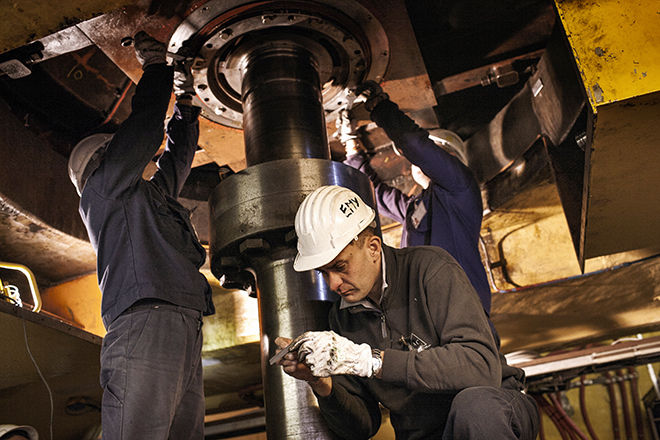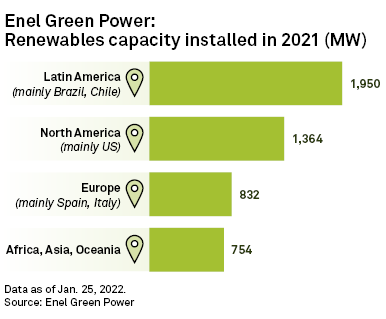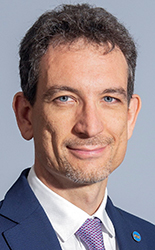S&P Global Offerings
Featured Topics
Featured Products
Events
S&P Global Offerings
Featured Topics
Featured Products
Events
S&P Global Offerings
Featured Topics
Featured Products
Events
Banking & Capital Markets
Economy & Finance
Energy Transition & Sustainability
Technology & Innovation
Podcasts & Newsletters
Banking & Capital Markets
Economy & Finance
Energy Transition & Sustainability
Technology & Innovation
Podcasts & Newsletters
S&P Global Offerings
Featured Topics
Featured Products
Events
25 Jan, 2022

By Camilla Naschert

| Enel employees at a hydro power plant in Italy. The company hired 1,500 new staff in 2021 but foresees recruitment difficulties further down the track. Source: Enel SpA |
As the pace of renewables installations accelerates globally, the market could face a shortage of skilled workers to develop projects in future years, the CEO of Italy's Enel Green Power said Jan. 25.
Salvatore Bernabei, head of the Enel SpA subsidiary, said work needs to start now to shore up skills and build up a pipeline of engineers, project developers and other specialists who will be at the forefront of the energy transition.
"Finding people with the right competencies is not a problem today, but it could be a problem if we decide to accelerate in certain geographies," Bernabei said in an interview.
Enel Green Power hired 1,500 new staff globally in 2021. This represents one-tenth of the company's entire workforce, which now stands at 15,000.
 |
But as the European renewables industry squares up to substantial capacity targets, hiring is becoming increasingly frenzied across the board.
In the EU alone, legislators would like to see 300 GW of offshore wind capacity by 2050, on top of big pledges for onshore wind and solar. Companies have reported challenges in filling positions for onshore wind technicians for some time, partly due to a drift into the higher-paid offshore space.
Oil major BP PLC, for instance, built an offshore wind team from the ground up in 2021, hiring an additional 100 people in the U.K. and the U.S. as it shoots for 50 GW of renewables by 2030.
'We have to start soon'
Enel Green Power, which is focused on onshore renewables, booked a record installation year in 2021, with 5.1 GW of new generation and storage assets built across the company's global markets to take its portfolio to about 54 GW. Bernabei said the company wants to add another 6.1 GW of renewables in 2022.
The company would like to grow faster in its home market of Italy, where the pace of capacity build-out has slowed due to a lack of progress on project permitting. "But if all of the permits would suddenly arrive tomorrow, for Enel and the other operators, there will be a problem in the market because there will not be sufficient competencies," Bernabei said.
 |
| Salvatore Bernabei, CEO of Enel Green Power since 2020. Source: Enel Green Power |
"Everyone should play their part now — the schools, the universities, the companies — to prepare [for] the transition," the CEO said. "But we have to start soon because we will have a bottleneck of competence in the next few years if we don't act now."
Some 1.2 million people work in the global wind industry, of which 300,000 are in Europe, according to trade group WindEurope. The organization expects this number to rise to 450,000 by 2030, requiring a "skills and training revolution" to avoid a slowdown in the global energy transition.
In a September 2021 interview, Swedish utility Vattenfall AB's CFO Kerstin Ahlfont described human resources as an issue of "key strategic importance." Indeed, experienced teams with specialist skills in renewables have become core to the valuation of companies being acquired by larger groups, market experts told S&P Global Market Intelligence earlier this month.
"We don't speak enough about [the people in the renewables industry]," Bernabei said.
Gender equality
Across Europe, an expansion drive for power generation and networks has increased the risk of talent shortages across ranks and disciplines. An underrepresentation of women in the pool of candidates, specifically for technology- and engineering-focused roles, is exacerbating this issue for the electricity sector.
According to Bernabei, diversity is top of mind in Enel Green Power's hiring drive and beyond. Of the 1,500 new joiners in 2021, one-third were women. "Our objective is to go into the direction of gender equality within the company, but it will take some time," Bernabei said.
To boost the talent pipeline, more women need to take up science, technology, engineering and mathematics degrees, the CEO said — something that Enel Green Power is looking to help facilitate alongside academic institutions.
In its own processes, Enel Green Power has gender-based targets for its hiring short lists. "We have defined that 50% should be women, 50% men," Bernabei said. The same applies to the company's internal succession planning.
Meanwhile, Enel Green Power is working to address any potential salary gaps, Bernabei said.
"By acting in different parts of the processes, from the schools to the internal way we manage people to the hiring process, we will go toward this gender objective," Bernabei said.
